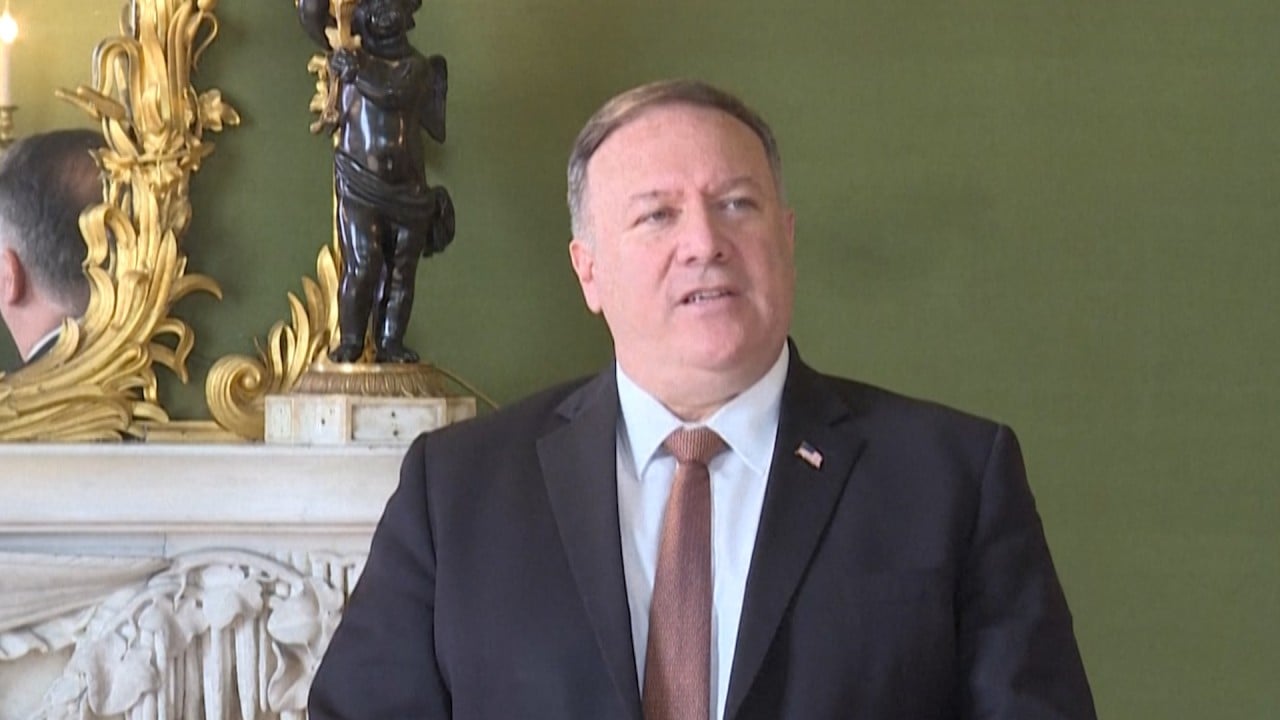
00:48
‘Frankenstein’ China requires more assertive global response, says US top diplomat Pompeo

Some speeches are unforgettable while others are hard to forget no matter how hard you try. Last week, the top US foreign policy official erupted on China in a speech for the ages, if not for war.
One hopes the speech will age quickly and pass quietly into the catacombs of history. Given at the Richard Nixon Presidential Library in Yorba Linda, California, Secretary of State Mike Pompeo’s address had the feel of a vintage newsreel, complete with black and white footage and clear-cut good guys and bad guys.
Its trendiest idea drew from 1983, when president Ronald Reagan denounced the “evil empire”, which was then the Soviet Union. Last week, Pompeo recycled this notion by evil-empiring China. It seems some ideas are just too good to retire, especially in the absence of new ones.
“If we don’t act now,” Pompeo said, “ultimately the CCP will erode our freedoms and subvert the rules-based order that our societies have worked so hard to build. If we bend the knee now, our children’s children may be at the mercy of the Chinese Communist Party, whose actions are the primary challenge today in the free world.”

00:48
‘Frankenstein’ China requires more assertive global response, says US top diplomat Pompeo
Is China really Pompeo’s primary problem at the moment? No fearsome challenge faces Pompeo’s boss, President Donald Trump, in the Republican primary, but November’s general election is another matter. Thus, framing China as the free world’s “primary challenge” is aimed at shielding Trump from the blows of defeat.
Even snake oil takes time to market. Team Trump probably launched its anti-China platform too late to save the election. Even so, the campaign might be starting to have effect, especially in Washington and New York, where pompous sages appear terribly aggrieved that China won’t roll over like some well-trained capitalist chihuahua.
To make matters worse, there’s enough optical ambiguity from the government’s policies of President Xi Jinping to make Pompeo’s anti-China push seem a plausible product. Then there are the matters of intellectual property theft, internet hacking, spies in US consulates and so on.
China has its own set of stories to tell but doesn’t seem to know how to tell them, or at least how to sell them, particularly in the US. Maybe it’s hopeless with people like Pompeo in power. The view from Washington seems to be that almost any story or opinion that offers a sympathetic view of China merits deep suspicion.
“This is where I am concerned about the American media, too,” Pompeo said in his speech. “When American institutions pick up those storylines [from China’s media] and carry them forward, they are, in fact, propagating Chinese propaganda, and we all ought to be wise to that.”

01:17
Pompeo urges all nations to 'push back' against China on visit to the UK
On the contrary, it might be a better world if there was value attached to at least listening to what China has to say, and perhaps learning something by at least trying to understand the other side. The same goes for China, though Beijing officials give the impression that they lend no more credence to US statements than we do to theirs.
China now appears not to care too much any more about what anyone thinks. What we have here is a perfect storm – a failure to communicate that at times seems almost deliberate.
The world needs Beijing to do better. How far does the Chinese government’s soft-power gang think it can get by simply riding on public relations generated by cute pandas? Too much of its hard-earned national wealth goes to its military, as it does in the US. Does the US government believe tough-talk policy will actually scare the Chinese? Surely not.
Could it frighten its own electorate into believing China is an even greater menace than Covid-19, though? Maybe. One speech will not accomplish that, but many more will come during the election campaign, a quadrennial political pandemic of its own. After more than two centuries of this infectious nonsense, we still have no vaccine.
If you hate China – or specifically the Communist Party – you will enjoy Pompeo’s gaseous eruptions. He is actually an intelligent man, albeit one with flawed assumptions about the world, but he can turn a phrase with the worst of them.
While negotiating arms control with then-Soviet leader Mikhail Gorbachev, Reagan repeatedly used the mantra “trust, but verify”. Pompeo takes it further: “Distrust and verify.” That’s progress?
Polls on the mainland report that most Chinese are happy enough with their government. So for Americans who subscribe to Pompeo’s view that “the old paradigm of blind engagement with China simply won’t get it done. We must not continue it and we must not return to it”, one wonders what other option Pompeo has in mind.
Professor Tom Plate is the distinguished scholar of Asian and Pacific Studies at Loyola Marymount University and vice-president of the Pacific Century Institute, both in Los Angeles